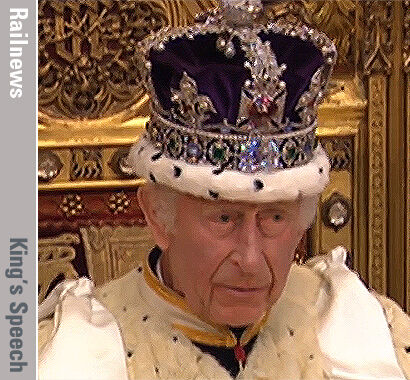HM the King has confirmed that Great British Railways will be created and private sector passenger operators nationalised.
► ‘Shadow’ Great British Railways to be set up straight away to start industry collaboration
► Three railway bills planned to allow public ownership, create full GBR, and look again at rail projects north of the West Midlands
► Ticketing reforms, Rail Freight support and green light for open access where it ‘adds value’
► Plans receive broad welcome, but Rail Partners claims nationalisation will increase costs
The industry has been swift to respond to the King’s Speech.
Railway Industry Association chief executive Darren Caplan said RIA ‘welcomes today’s King’s Speech as a strong legislative programme for driving growth by building sustainable infrastructure and improving transport‘.
He continued: ‘RIA and our members support the Government’s pledge to establish a reformed and unified railway system under Great British Railways focused on improving affordability, reliability and performance. A new body with strategic oversight and responsibility for rail can focus on meeting growing passenger demand and boosting industry revenues.
‘Rail suppliers will also be positive about the previously announced plans to set out a strong and visible pipeline of rail work for the sector and to develop a long-term industrial strategy for rolling stock. Accelerating new train orders and low carbon network upgrades can fast-track growth by boosting jobs and skills across the UK and we would encourage the new Government to prioritise such investment. We look forward to more details of how these commitments will be implemented in due course.’
Union reactions
The general secretary of the RMT Mick Lynch said: ‘We welcome today's announcements specifically around removing restrictions on trade unions, the New Deal for workers and the rolling out of public ownership of our railways.
‘These achievements are down to pressure from the trade union movement, and we will continue to articulate what is in the best interests of railway workers and working people as a whole. We will also continue to actively engage with the government on the pay issues in our sectors which can be resolved quickly.
‘Labour has also committed to upgrading rail connectivity in the North. Our belief is that HS2 remains the best option for improving transport links, promoting economic growth and building a modern railway infrastructure, fit for the 21st century.’
ASLEF general secretary Mick Whelan also welcomed the government’s plans. He said: ‘Keir Starmer has delivered today on the Labour Party’s manifesto commitment by setting out plans to bring Britain’s railways back into public ownership.
‘This is the right decision, at the right time, to take the brakes off the UK economy and rebuild Britain. John Major’s decision to privatise British Rail in 1994 was foolish, ideologically-driven, and doomed to fail. It was described even by that arch-privateer Margaret Thatcher as “a privatisation too far” and so it has proved.
‘The privateers have taken hundreds of millions of pounds from our railways and successive Conservative governments have pursued a policy of managed decline which has sold taxpayers, passengers, and staff short.
‘Now we are going to see the wheels and the steel put back together, an end to the failed fragmentation of our network, and a railway brought back into the public sector, where it belongs, to be run as a public service, not for private profit.’
‘Signal of intent’
Urban Transport Group director Jason Prince said: ‘The King’s Speech sends a strong signal of intent that this Government is serious about transforming our transport sector.
‘Our rail services need reform, so it is encouraging that the Government is moving ahead with the creation of Great British Railways. And on buses, local leaders will be given greater powers to franchise or publicly own bus services – powers we have long called for.
‘Together with the recognition that greater devolution can herald positive change for local communities, these new Bills could lead to big improvements in transport.’
Costs warning
However, the private sector operators’ lobby group Rail Partners claimed ‘full nationalisation is a political not a practical solution, which will increase costs over time’.
Rail Partners chief executive Andy Bagnall said: ‘The commitment to reform in today’s King’s Speech is an important milestone. However, getting the detail right below the headline is critical to achieving the government’s ambitions for green growth and reducing the railway’s financial burden on the taxpayer.
‘We want the same outcomes as the new Labour Government – a better railway for those that use it and pay for it. But to change the railway for the better, we must correctly understand the causes of the current challenges to get the right solutions – and full nationalisation is a political not a practical solution, which will increase costs over time.
‘We welcome the recognition that private sector freight and open access operators have a lot to offer, but passenger train companies also have a track record of growing the railway. They want to partner with the government to achieve this success again, within the new framework.’
The programme of legislation set out in the King’s speech was being debated in the House of Commons later the same day.


